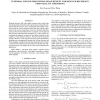Free Online Productivity Tools
i2Speak
i2Symbol
i2OCR
iTex2Img
iWeb2Print
iWeb2Shot
i2Type
iPdf2Split
iPdf2Merge
i2Bopomofo
i2Arabic
i2Style
i2Image
i2PDF
iLatex2Rtf
Sci2ools
ICASSP
2010
IEEE
2010
IEEE
Temporal motion smoothness measurement for reduced-reference video quality assessment
Reduced-reference (RR) video quality measures aim to predict the perceptual quality of distorted video signals using only partial information about the reference video. Existing RR video quality assessment models are mostly designed and/or trained for specific applications such as lossy compression, where the detectable distortion types are often fixed and limited. Here we propose a novel approach that measures temporal motion smoothness of a video sequence by examining the temporal variations of local phase structures in the complex wavelet transform domain. We show that the proposed measure can detect a wide range of well-known practical distortions, including noise contamination, blurring, line or frame jittering, and frame dropping. In addition, the proposed algorithm does not require a costly motion estimation process and has a low RR data rate, making it much easier to be adopted in real-world visual communication applications.
| Added | 06 Dec 2010 |
| Updated | 06 Dec 2010 |
| Type | Conference |
| Year | 2010 |
| Where | ICASSP |
| Authors | Kai Zeng, Zhou Wang |
Comments (0)

